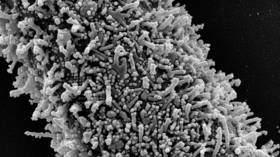Study reveals what could be behind long Covid

Researchers at South Africa’s Stellenbosch University say they have evidence that significant and persistent microclotting may explain the symptoms experienced by people suffering from ongoing symptomatic coronavirus.
Writing in a piece published in The Guardian on Wednesday, Resia Pretorius, a professor of physiological sciences, revealed the findings of her study into the identification and causes of long Covid.
Pretorius ascribed the condition and its symptoms to a phenomenon known as microclotting. “A recent study in my lab revealed that there is significant microclot formation in the blood of both acute Covid-19 and long Covid patients,” the scientist wrote.
She noted that humans are normally able to break down clots through a process called fibrinolysis. However, data from her study shows that those suffering from long Covid have been unable to overcome microclots.
“The presence of persistent microclots and hyperactivated platelets (also involved in clotting) perpetuates coagulation and vascular pathology, resulting in cells not getting enough oxygen in the tissues to sustain bodily functions (known as cellular hypoxia),” she wrote.
She concluded that hypoxia could be the cause of the debilitating symptoms reported by long Covid patients.
This reinforces earlier observations that acute Covid-19 affects not only the respiratory system, but the cardiovascular system too.
Pretorius noted that people suffering from long Covid are not able to have their condition easily diagnosed as the appropriate pathology tests are not readily available.
She called for “urgent” research into the condition in order to aid diagnosis and develop treatment protocols, especially given hypoxia can elevate the risk of stroke and heart attack.
It is believed 100 million people around the world are suffering from ongoing symptomatic coronavirus. Sufferers report a number of symptoms, including extreme fatigue, brain fog, muscle weakness, and sleep difficulties, as well as the ongoing respiratory problems associated with Covid-19.
Others have noted the development of anxiety and depression.
Replies